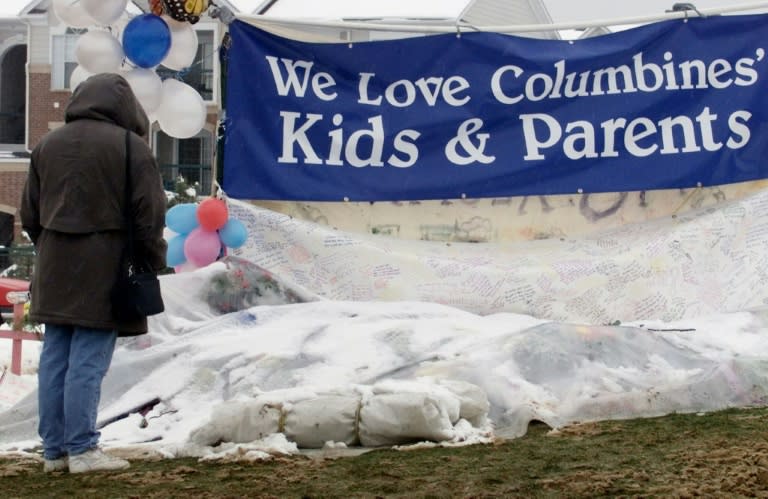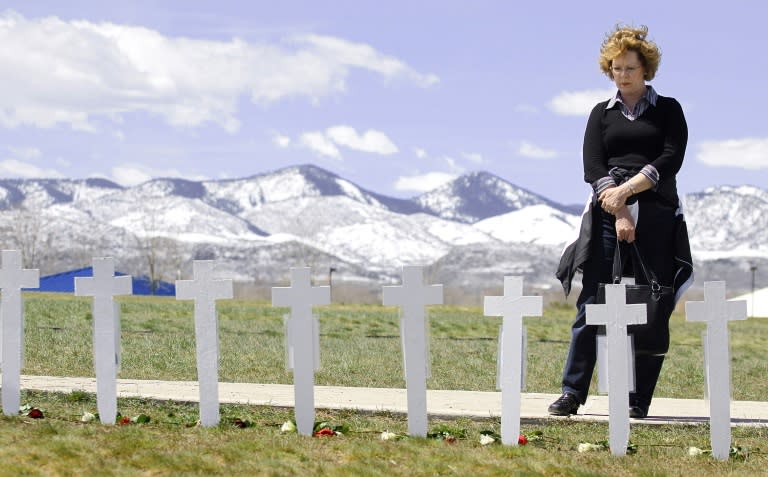Columbine shooter's mother 'saw no signs of his mental distress'
The mother of a teen involved in the deadliest high school shooting in US history said she saw no signs of her son's mental distress ahead of the 1999 Columbine massacre. In her first TV interview since the killings, Sue Klebold apologized on behalf of her son Dylan. The 17-year-old and his best friend Eric Harris, 18, came to school on April 20, 1999 dressed in black trenchcoats and carrying four guns. They opened fire, killing 13 people and wounding 24 in Columbine before killing themselves. Nearly 17 years have passed since that fateful day, and Klebold said in an interview with ABC's 20/20 news show that has been living with guilt ever since. "I am so sorry for what my son did," Klebold, 66, said in the interview broadcast late Friday. "Yet I know that just saying I'm sorry is such an inadequate response to all this suffering. There is never a day that goes by where I don't think of the people that Dylan harmed." Klebold said it is "very hard to live with the fact that someone you loved and raised has brutally killed people in such a horrific way. "The last moments of his life were spent in violence, sadism. You know, he was cruel and hateful and -- and I have to own that." If another child had shot her son, she said she immediately would have blamed the child's parents. "I think we like to believe that our love and our understanding is protective. And that if anything were wrong with my kids, I would know. "But I didn't know. And I wasn't able to stop his hurting other people. I wasn't able to stop his hurting himself. And it's very hard to live with that." - Missed warning signs? - Klebold said her son was a shy, likeable kid who went to parties with friends and grew up in a loving two-parent household. There were no signs of Dylan's murderous tendencies, Klebold said. "If I had recognized that Dylan was experiencing some real mental distress, he would not have been there. He would've gotten help. "I don't ever, for a moment, mean to imply that I'm not conscious of the fact that he was a killer, because I am," she said. In Dylan's later teen years Klebold did notice personality changes, but she attributed it to adolescent development. "Sometimes he would seem ... distant or quiet. And I remember asking him, 'Are you okay? Are you sure you're okay? You seem so tired,' and he'd stand up and say, 'I've got a lot of homework. I just, I need to go to bed.'" About a year and a half before the shooting Dylan hacked into the school computer system with friends, earning him a three-day suspension. Around this time police arrested Klebold after he and a friend were caught breaking into a van to steal electronic equipment. "It was terrible, I know. Absolutely. It was awful," Klebold said. "And at the time, I thought that was the worst thing I could ever possibly experience." Nevertheless Klebold was convinced that Dylan would tell her about his problems. "I felt that I was a good mom. That he would, he could talk to me about anything." After the shooting, Klebold was shocked to realize that "what I believed and how I lived and how I parented was an invention in my own mind." Police discovered that, starting at age 15, Dylan kept a secret journal in which he wrote about suicide and loneliness. The interview coincides with the release of Klebold's book titled "A Mother's Reckoning: Living in the Aftermath of Tragedy." Klebold said that all profits from the book will go to mental health charities.

 Yahoo Finance
Yahoo Finance 


